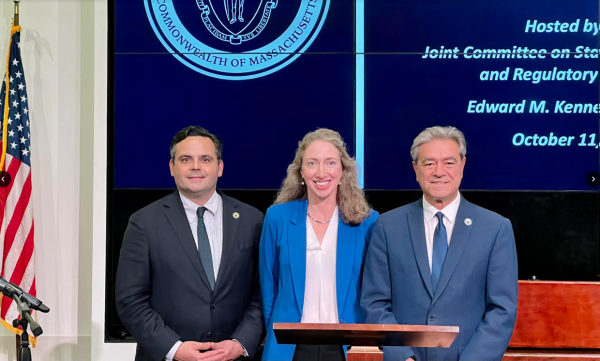November 1, 2023

Sen. Nick Collins, Carrie Benedon of the Attorney Generals’ office, and state Rep. Antonio F.D. Cabral at the EMK Institute event last month. Cassidy McNeeley photo
State officials last week used Dorchester’s replica of the world’s greatest deliberative chamber to clarify the Massachusetts “open meeting law” and offer training for those interested in navigating the oft-opaque world of government deliberations.
The Edward M. Kennedy Institute for the United States Senate, the Columbia Point non-profit boasting a restaged Senate floor, hosted the Legislature’s Joint Committee on State Administration and Regulatory Oversight, and a top law enforcement official who previewed statutory changes that may occur in 2025.
Modest in-person turnout but heavier participation online for the Oct. 11 meeting may have previewed how government transparency will work in the future, said state Sen. Nick Collins, who co-chairs the panel.
“We are very happy with the turnout and with 80 percent of participants doing so remotely, it really highlights that the hybrid option will be key to ensuring the broadest access to public meetings going forward,” the senator said.
Collins and state Rep. Antonio F.D. Cabral welcomed community members, elected officials, including District 3 City Councillor Frank Baker, and civic leaders, who settled in seats identical to those in the US Senate Chamber. Then the elected officials turned the session over to Carrie Benedon, assistant state attorney general, who conducted the training session.
The state’s open meeting law, which requires that many deliberations of public bodies be held in public, has undergone modifications since the outbreak of Covid-19. Governor Healey in March signed into law extensions, until 2025, of Covid-era loopholes that permit public entities to hold meetings remotely.
“I hope people know how important it is for members of the public to be informed because they really are often the ones who can flag concerns as they are arising and can help to promote transparency,” said Benedon, who, during the hour-long presentation, explained that the law’s purpose is to ensure public bodies take transparent measures through the requirement of notice, open deliberations, and public access.
Benedon also discussed the process of how meeting notices must be posted, and how minutes must be kept. She concluded the presentation with a discussion on the complaint process and then opened the floor to questions.
“A tool like this [the training session] is for the public to have the ability to hold their public bodies accountable,” said Baker. “It’s there to make sure that people like myself are being upfront and straight and doing what I say I’m doing at all times.”
Collins agreed that the training session was helpful for the public. “I hope those who participated – members of the public and public officials across the state – are able to exercise their rights and perform their duties with more precision and a better understanding of the Open Meeting Law,” he said.
Between the online and in-person audience, an estimated 100 people attended the session. While the next in-person meeting has not been scheduled, live webinar training occurs twice a month online at Mass.gov.


